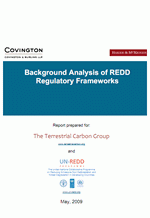Background Analysis of REDD Regulatory Frameworks
By Terrestrial Carbon Group Project, UN-REDD View PublicationThis report provides an overview of the activities that a selection of developed and developing countries are taking to develop policy and legislative frameworks to enable REDD activities to take place. From a developed country perspective, support for REDD comes through first, the establishment of clear signals to developing countries that they will provide technical and financial assistance to put place the institutional and technical structures that allow REDD projects to take place, and second, by creating a demand for the REDD credits that may be generated in a developing country. In addition to these two key roles, developed countries are also able to provide examples of how many of the issues that underpin the establishment of REDD Credits have been addressed. For example, how to create a tradeable forest carbon product through separating carbon property rights from forest or land rights and how to manage land tenure and issues related to conflicting interests in land.
From a developing country perspective, there are a number of steps that need to be taken to prepare for REDD and to put REDD into practice. Initially these steps involve developing capacity to measure, monitor and verify forest carbon stocks and putting in place institutional capacity to support the management of forests over the long-term to maximize carbon volumes. In addition, and at the heart of this report, is the need to clarify from a legal perspective, how developing country governments will create the enabling environment to support the creation of tradeable REDD credits.

